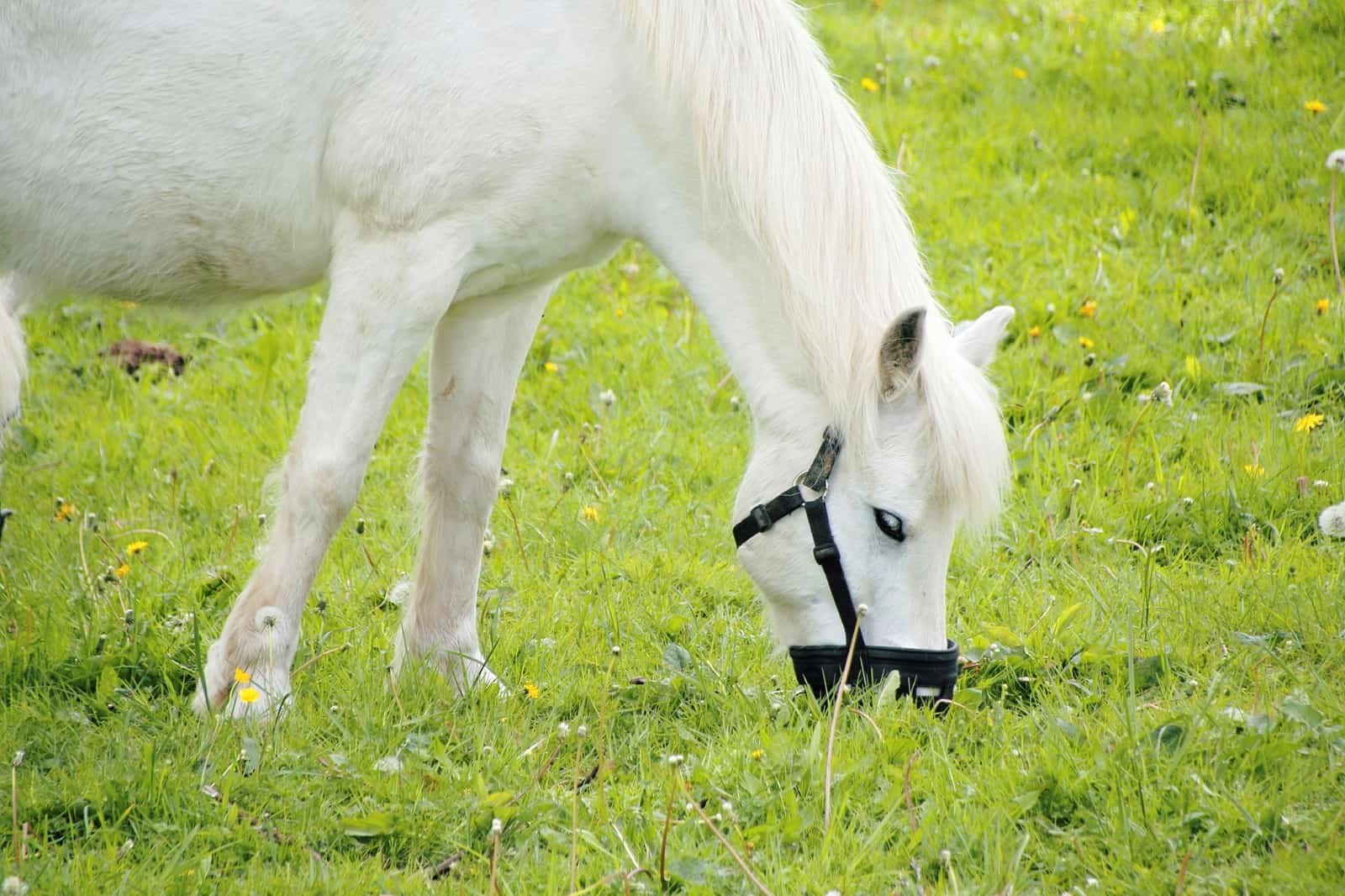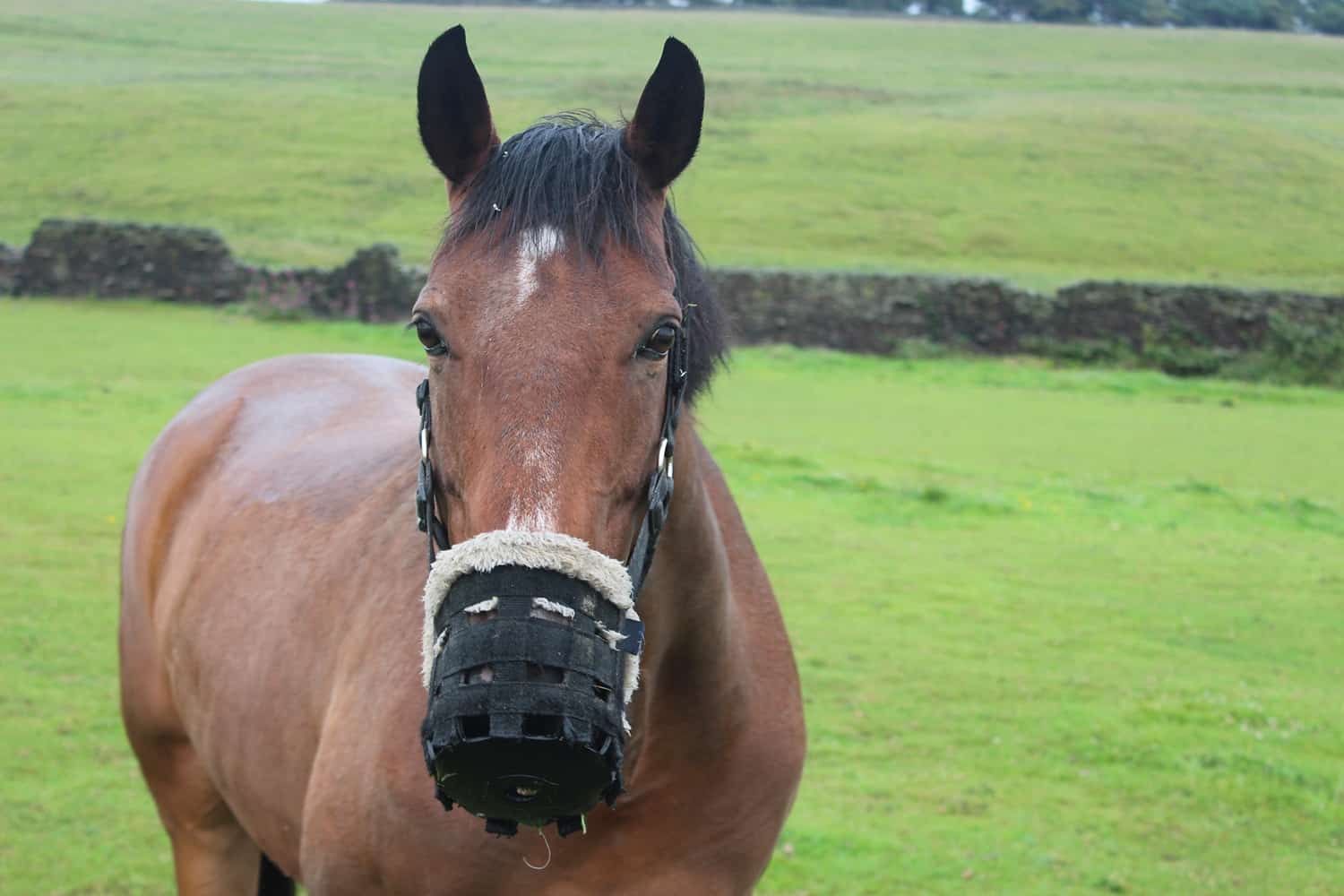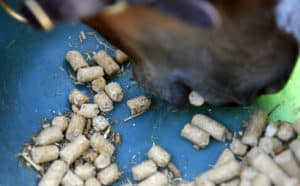Horse Grazing Muzzle FAQs

From proper fit to feeding, here’s what you need to know about these weight-loss contraptions
Central Kentucky is home to boundless pastures filled with abundant, nutrient-rich grass. As I’ve learned since moving here, this is a dream for some horse owners and a nuisance for others. Each spring, as fields turn green, many of my barn friends begin digging out their horses’ grazing muzzles, applying them before turnout, and hoping their charges are still wearing them at the end of the day.
“But why are they keeping their horses from eating all the yummy grass?” a nonhorsey acquaintance once asked me. Why do some horses wear muzzles, but others don’t? Do they have to wear them all the time? And these questions aren’t unique to nonequestrians. A fellow horse owner once asked, “Erica, why are you putting a muzzle on your lean Thoroughbred?” Others ask the quintessential question: How do I keep this gosh-darn thing on?
Don’t worry, we have answers. In this article Bill Gilsenan, VMD, Dipl. ACVIM (LAIM), a practitioner at Rood & Riddle Equine Hospital in Lexington, and Krishona Martinson, PhD, associate professor and equine extension specialist in the University of Minnesota’s Department of Animal Science, in Falcon Heights, will address commonly asked questions, beginning with the most pertinent:
Why would my horse need a grazing muzzle?
Not all horses need muzzles. In fact, many do well on pasture year-round. However, muzzles are lifesavers for some.
“Certain breeds of horses—including ponies, Saddlebreds, and Morgan horses, among others—are very efficient with their nutrition and can store fat readily,” says Gilsenan.
While this is an advantage in harsh environments, he says, horses with access to healthy pastures and high-quality nutrition tend to gain weight rapidly.
“Lush feeds high in sugar (such as grass) can promote insulin resistance and lead to laminitis,” he says, referring to reduced sensitivity to insulin that decreases a horse’s ability to transport glucose into the body’s cells from the bloodstream. “This is the basis for the condition we know as equine metabolic syndrome (EMS). Many older horses develop a different disease—equine Cushing’s disease (pituitary pars intermedia dysfunction, or PPID)—that can lead to laminitis via a similar mechanism. Grazing muzzles are appropriate for horses with these conditions.”
Martinson says owners also use muzzles to restrict fat horses’ grass intake without limiting their pasture access.
“For example, an owner has a small herd and manages the horses as a herd (vs. individuals) due to personal preference or facility layout,” she says. “Many times, only one horse is overweight. Fitting the overweight horse with a muzzle is usually a simpler management decision compared to separating one horse from the rest of the herd.”
Veterinarians and nutritionists even recommend muzzles for otherwise healthy horses with a history of EMS, PPID, laminitis, and/or obesity to prevent such issues from arising again. In my Thoroughbred’s case, despite his hard-keeping tendencies, a recent laminitic episode prompted my veterinarian to recommend a muzzle as we began reintroducing summer turnout after three months of stall rest.
The bottom line: Many horses benefit from wearing a grazing muzzle. If you’re not sure your horse needs one, ask your veterinarian or nutritionist for advice.
How long will it take my horse to get accustomed to his muzzle?
“Horses do take some time to adjust to the muzzle, and this time depends on the horse,” Martinson says. “However, most horses will adjust relatively quickly, usually within a week. Our experience is that many horses who require a muzzle are easy keepers or are very food-motivated. Therefore, they are keen on figuring out how to use the muzzle.”
Gilsenan says introducing the muzzle gradually and having the horse wear it for progressively longer each day can help.
Watch your horse carefully during this acclimation period, Martinson advises. “If a horse is not adjusting well (i.e., displaying aggressive behaviors, not eating), owners should seek other ways of limiting pasture access,” such as drylot turnout.
Does my horse need a muzzle year-round?
Probably not, our sources say, but “muzzle season” depends on where your horse lives.
“In Minnesota, we only have pasture for six months, so there is no need to fit the horse with a grazing muzzle during the winter months when horses are confined to a drylot and fed hay,” says Martinson. “If you live in an area where horses have year-round access to pasture, and your horse is overweight, then a grazing muzzle might be needed until the horse achieves a healthy body weight. Once (he does) you may no longer need the muzzle, especially if other management practices have been put into to place, like exercise.”
I feel bad keeping my horse’s muzzle on every day. Can he just wear it every other week?
No. Our sources agree that this practice can completely derail your goals.
“Horses can consume a large amount of grass in a short period of time, so all the work done with a grazing muzzle can get undone in a hurry,” says Gilsenan.
Further, Martinson said, researchers from North Carolina State University discovered horses can learn to anticipate pasture access and adjust their grazing schedules accordingly.
“Kind of like a person going on a diet, consistency is a really important thing to abide by,” Gilsenan says. If you make the effort to muzzle your horse, don’t let your hard work go to waste.
Should I take the muzzle off regularly?
Yes. If possible, give your horse a break from the muzzle each day.
“The grazing muzzle should not be kept on for longer than 10 to 12 hours a day,” says Gilsenan. “For the remainder of the time, the horse can be brought into a stall or a drylot”
If neither is available, Martinson recommends leaving the horse muzzled at pasture.

How can I achieve and maintain proper muzzle fit?
Gilsenan says you should be able to fit two fingers between the muzzle (all the way around its circumference) and the horse’s face.
There are a variety of muzzle brands and styles, and not every one will work for every horse. “Owners might have to try a few options before they find one that fits and works well for their horse and situation,” Martinson says.
“Many owners do use other tricks, including sheepskin, padding, and duct tape, to help fit and keep muzzles on horses,” she adds, noting that owners should check their muzzled horses for rub marks daily.
If it’s rubbing, Gilsenan says, it’s too small and should be replaced. He also encourages owners to choose muzzles with breakaway safety features, such as a leather crownpiece or connector that will break under pressure.
My horse won’t keep his muzzle on. What do I do?
Ah, the question to which every owner seeks an answer. Unfortunately, our sources’ reply might not be the one they’re looking for.
“If a horse won’t keep his muzzle on, it might not be fitted properly, or it might not be comfortable,” says Gilsenan.
Again, trial and error with different muzzles and padding types might help you find a solution.
However, “if troubleshooting a good fit doesn’t work, it may be more appropriate to limit your horse’s feed intake by turning him out on a drylot,” he adds.
Martinson agrees: “A grazing muzzle might not work for every horse. If your goal for your horse is body weight loss, confining the horse to a drylot, feeding a restricted diet, and starting and maintaining an exercise plan (if your horse is sound) would also be recommended.”
Do I need to adjust my muzzled horse’s diet to ensure he gets the nutrients he needs?
It depends. Your veterinarian or equine nutritionist can advise on whether your horse’s diet needs to change.
“Our research shows that using a grazing muzzle reduced pasture intake by only 30%,” says Martinson. “This should help horses slowly and safely lose body weight over time. As long as the horse can easily consume water and has pasture access for most of the day, the pasture should provide most of the necessary nutrients for most classes of horses.”
Muzzles typically don’t interfere with water intake as long as the water source, be it a stock tank or an automatic waterer, is large enough to accommodate a muzzle.
Whether a horse needs supplemental feed depends on the quality of the hay or pasture he consumes, Gilsenan says. Good-quality grass and hay might meet all of a horse’s nutritional requirements, while lesser-quality forage might leave his diet deficient, especially if he’s in a regular exercise program.
“Complete pelleted feeds might be helpful additions to his diet,” he says. “In other instances, a ration balancer might be more appropriate.”

Complete feeds, when fed at the recommended feeding rate (around 1.5% of the horse’s weight), contain everything your horse needs in his diet, including forage. Calorie contents vary—so check the label carefully if you’re looking for a low-calorie option—but many are comparable to a good-quality grass or mixed hay.
Ration balancers are low-calorie, nutrient-dense products with low feeding rates (often a pound or two each day) designed to be fed alongside forage.
Martinson suggests putting your horse in a stall or drylot to eat grain or concentrates so you can control or eliminate his grass access when he’s sans muzzle.
“If the horse is consuming hay, the muzzle should be removed since there is limited data available on a horse’s ability to access hay though a grazing muzzle,” she adds.
Ultimately, Gilsenan says, “the important message to remember is that your horse can have an appropriate, complete, and healthy diet, while also wearing a grazing muzzle for certain parts of the year.”
What if my horse loses weight rapidly? Or doesn’t lose any?
A good rule of thumb when gauging weight loss while muzzled, says Gilsenan, is that you can expect your horse to lose about 1% of his body weight per week. You probably won’t notice this drop until three to four weeks have passed. Martinson says owners with muzzled horses should monitor them at least daily to ensure muzzles are still intact, rubs haven’t developed, and horses are eating and drinking normally.
“If your horse is losing too much weight, it may be necessary to supplement his diet with more hay or lower-starch grains,” says Gilsenan.
Rapid weight loss can also put some equids—especially donkeys and Miniature Horses—at risk of hyperlipemia. This condition is characterized by excessive fat mobilization from adipose (fat) tissue, resulting in high blood lipid concentrations, and can cause liver and kidney damage.
If your horse is not losing weight, be sure he isn’t sneaking extra grass through the grazing muzzle, Gilsenan says. “If the muzzle is fitted well, it may be necessary to limit other portions of his diet or increase his turnout so he can move around more (and work off some of the weight).”
Martinson encourages owners to track body condition changes, as well as adjustments in diet, management, and exercise, weekly. The University of Minnesota Extension offers a Healthy Horse smartphone app to help owners track their horses’ body weights.
Do muzzles affect horse behavior?
They can—for better or worse.
On one hand, Martinson says, “recent research from the University of Kentucky suggests muzzled horses do walk more compared to unmuzzled horses (TheHorse.com/110525).
However, she notes that owners should keep an eye on their horses when muzzled, watching for any associated uncharacteristic or aggressive behaviors and addressing them if needed. “Remember, not all horses will acclimate to a grazing muzzle,” she says. “However, in our experience, most will acclimate if given time.”
The Bottom Line
While they can be a chore for owners to manage, grazing muzzles play an important role in keeping many horses healthy. Overweight horses are in danger of developing health issues, Martinson says. “Therefore, its best to use a grazing muzzle to reduce body weight or to stop/slow additional body weight gain,” she says. “I think it’s important owners realize a grazing muzzle is not cruel, but is actually a great way to manage body weight while allowing the horse the ability to exercise and socialize in a herd.”

Written by:
Erica Larson
Related Articles
Stay on top of the most recent Horse Health news with















